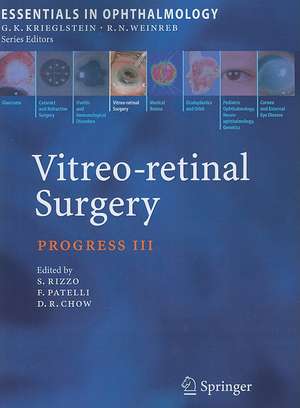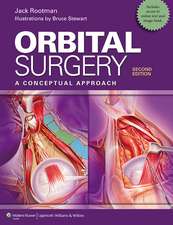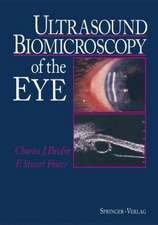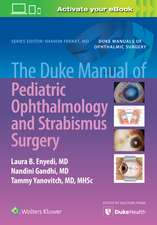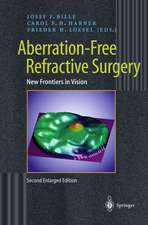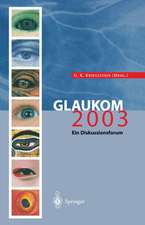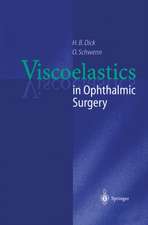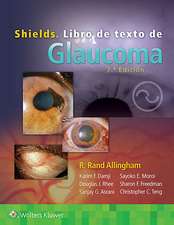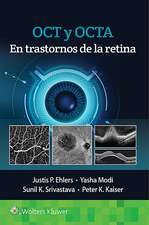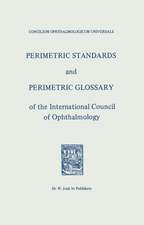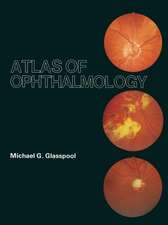Vitreo-retinal Surgery: Progress III: Essentials in Ophthalmology
Editat de Stanislao Rizzo, Fabio Patelli, David Chowen Limba Engleză Paperback – 18 noi 2010
However, in the last few years the approach to vitreoretinal surgery has changed with the introduction of small gauge instruments and sutureless surgery. At present there is still confusion among vitreoretinal surgeons about the use of 25-, 23- or 20-gauge sutureless systems.
Leading surgeons in the field were recruited to offer their insights into the sutureless techniques they perform.
Topics dealt with in the book include: - fluidics and technical characteristics of 23- and 25-gauge systems, - basic vitrectomy techniques of 23- and 25-gauge systems, - sclerotomy characteristics of the sutureless approach, - advantages and disadvantages of the sutureless technique, - vitreoretinal pathologies treated with 23- and 25-gauge systems, - complications of the sutureless technique, - current clinical data.
Din seria Essentials in Ophthalmology
- 5%
 Preț: 452.77 lei
Preț: 452.77 lei - 5%
 Preț: 550.16 lei
Preț: 550.16 lei - 5%
 Preț: 717.93 lei
Preț: 717.93 lei - 5%
 Preț: 202.57 lei
Preț: 202.57 lei - 5%
 Preț: 719.02 lei
Preț: 719.02 lei - 5%
 Preț: 719.38 lei
Preț: 719.38 lei - 5%
 Preț: 1164.31 lei
Preț: 1164.31 lei - 5%
 Preț: 724.14 lei
Preț: 724.14 lei - 5%
 Preț: 1111.26 lei
Preț: 1111.26 lei - 5%
 Preț: 715.00 lei
Preț: 715.00 lei - 5%
 Preț: 561.44 lei
Preț: 561.44 lei - 5%
 Preț: 1119.68 lei
Preț: 1119.68 lei - 5%
 Preț: 474.88 lei
Preț: 474.88 lei - 5%
 Preț: 1325.18 lei
Preț: 1325.18 lei - 5%
 Preț: 1106.13 lei
Preț: 1106.13 lei - 5%
 Preț: 651.54 lei
Preț: 651.54 lei - 5%
 Preț: 846.13 lei
Preț: 846.13 lei - 5%
 Preț: 366.35 lei
Preț: 366.35 lei - 5%
 Preț: 1433.10 lei
Preț: 1433.10 lei - 5%
 Preț: 751.21 lei
Preț: 751.21 lei - 5%
 Preț: 847.00 lei
Preț: 847.00 lei - 5%
 Preț: 782.10 lei
Preț: 782.10 lei - 5%
 Preț: 1292.35 lei
Preț: 1292.35 lei - 5%
 Preț: 720.03 lei
Preț: 720.03 lei - 5%
 Preț: 668.67 lei
Preț: 668.67 lei - 5%
 Preț: 1104.48 lei
Preț: 1104.48 lei - 5%
 Preț: 1341.85 lei
Preț: 1341.85 lei - 5%
 Preț: 973.89 lei
Preț: 973.89 lei - 5%
 Preț: 719.74 lei
Preț: 719.74 lei - 5%
 Preț: 1096.62 lei
Preț: 1096.62 lei - 5%
 Preț: 1050.38 lei
Preț: 1050.38 lei - 5%
 Preț: 1411.15 lei
Preț: 1411.15 lei - 5%
 Preț: 1206.62 lei
Preț: 1206.62 lei - 5%
 Preț: 1256.03 lei
Preț: 1256.03 lei - 5%
 Preț: 371.83 lei
Preț: 371.83 lei - 5%
 Preț: 778.80 lei
Preț: 778.80 lei - 5%
 Preț: 1314.06 lei
Preț: 1314.06 lei
Preț: 656.66 lei
Preț vechi: 691.22 lei
-5% Nou
Puncte Express: 985
Preț estimativ în valută:
125.67€ • 136.46$ • 105.56£
125.67€ • 136.46$ • 105.56£
Carte tipărită la comandă
Livrare economică 18-24 aprilie
Preluare comenzi: 021 569.72.76
Specificații
ISBN-13: 9783642088988
ISBN-10: 3642088988
Pagini: 252
Ilustrații: XVIII, 234 p. 50 illus., 31 illus. in color.
Dimensiuni: 193 x 260 x 13 mm
Greutate: 0.52 kg
Ediția:Softcover reprint of hardcover 1st ed. 2009
Editura: Springer Berlin, Heidelberg
Colecția Springer
Seria Essentials in Ophthalmology
Locul publicării:Berlin, Heidelberg, Germany
ISBN-10: 3642088988
Pagini: 252
Ilustrații: XVIII, 234 p. 50 illus., 31 illus. in color.
Dimensiuni: 193 x 260 x 13 mm
Greutate: 0.52 kg
Ediția:Softcover reprint of hardcover 1st ed. 2009
Editura: Springer Berlin, Heidelberg
Colecția Springer
Seria Essentials in Ophthalmology
Locul publicării:Berlin, Heidelberg, Germany
Public țintă
Professional/practitionerCuprins
Historical Overview of Microincision Surgery.- 25-Gauge Instrumentation: Engineering Challenges and Tradeoffs.- 25-Gauge, Sutureless, Trans-Conjunctival Vitrectomy.- Transconjunctival 23-Gauge Vitrectomy.- 23-Gauge One-Step Instrumentation.- Small Gauge Vitrectomy: Anesthesia, Incision Technique and Cannula Removal.- Comparison of 25-Gauge Trocar/Cannula Wound Healing and Remodeling with In Vivo Vitrector Flow Analysis.- 25-Gauge Vitreous Surgery: Getting Started.- 25-Gauge Macular Surgery: Principles and Instrumentations.- 25-Gauge Sutureless Vitrectomy for Diabetic Retinopathy.- Small-Gauge Vitrectomy for Retinal Detachment.- Perfluorocarbon-Perfused 25-Gauge Vitrectomy.- Primary 25-Gauge Vitrectomy with Topical Anesthesia for Persistent Vitreous Floaters.- 25-Gauge Vitrectomy in Infectious Endophthalmitis.- 25-Gauge Transconjunctival Sutureless Vitrectomy for Vitreous and Retinal/Choroidal Biopsy.- Uveal Biopsy with 25-Gauge Vitrector: Work in Progress.- The Use of 25-Gauge Vitrectomy Systems in the Management of Trauma.- Small-Gauge Approach in Pediatric Vitreoretinal Surgery.- Combined Phaco/25-Gauge Vitrectomy.- Complications of 25-Gauge Vitrectomy.- A Comparison of 20- vs 25-Gauge Vitrectomy: Does Size Matter?.- 20-Gauge Sutureless Vitrectomy Trocar System.- 20-Gauge Non-Cannulated Sutureless Vitrectomy.- Small-Gauge Vitrectomy: Which Calliper Should We Choose and When?.- Current Clinical Data and Future (for Small-Gauge Vitreoretinal Surgery).- Pearls from Experts.
Textul de pe ultima copertă
Since the introduction of vitrectomy in the 1970s, vitreoretinal surgery has rapidly developed. Initially, new instrumentations were created to facilitate intraocular maneuvers and to treat almost all the vitreoretinal pathologies. High speed vitrectome probs, forceps, scissors, endolaser probes, and new light sources (xenon/photon light) permit us to perform safer surgeries.
However, in the last few years the approach to vitreoretinal surgery has changed with the introduction of small gauge instruments and sutureless surgery. At present there is still confusion among vitreoretinal surgeons about the use of 25-, 23- or 20-gauge sutureless systems.
Leading surgeons in the field were recruited to offer their insights into the sutureless techniques they perform.
Topics dealt with in the book include:
fluidics and technical characteristics of 23- and 25-gauge systems
basic vitrectomy techniques of 23- and 25-gauge systems
sclerotomy characteristics of the sutureless approach
advantages and disadvantages of the sutureless technique
vitreoretinal pathologies treated with 23- and 25-gauge systems
complications of the sutureless technique
current clinical data
However, in the last few years the approach to vitreoretinal surgery has changed with the introduction of small gauge instruments and sutureless surgery. At present there is still confusion among vitreoretinal surgeons about the use of 25-, 23- or 20-gauge sutureless systems.
Leading surgeons in the field were recruited to offer their insights into the sutureless techniques they perform.
Topics dealt with in the book include:
fluidics and technical characteristics of 23- and 25-gauge systems
basic vitrectomy techniques of 23- and 25-gauge systems
sclerotomy characteristics of the sutureless approach
advantages and disadvantages of the sutureless technique
vitreoretinal pathologies treated with 23- and 25-gauge systems
complications of the sutureless technique
current clinical data
Caracteristici
Indispensable for continuous education and advanced training All editors with international reputation and contributing authors with great expertise in their topic Well-structured text and design, quick and easy to read Bridges the gap between primary literature and daily practice Every 2nd year each subject is covered with timely information about new developments in the specialised field Includes supplementary material: sn.pub/extras
